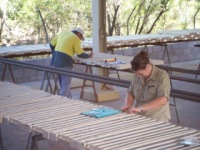Uranium mining will be allowed in the Australian state of Queensland after the state government overturned 23 years of prohibition. The state has not produced uranium since 1982.
 |
| Uranium exploration has continued in Queensland (Image: Summit Resources) |
State premier Campbell Newman has announced that a three-member implementation committee will be convened to oversee the recommencement of uranium mining in the state, which has several known uranium deposits. He said in a statement that the decision to allow uranium mining to restart in the state had been made following "sustained public debate", and also acknowledged strong support for the uranium industry from the Australian federal government. The committee will report back to the state government within three months.
In the same statement, minister for natural resources and mines Andrew Cripps noted that the recommencement of uranium mining would not extend to the consideration of nuclear energy production or nuclear waste disposal plants in Queensland.
Uranium was first mined in Queensland in the 1950s, but no uranium has been mined there since the closure of the Mary Kathleen mine in 1982. In 1989, the election of a state government led by the Australian Labor Party effectively saw uranium mining, but not exploration, prohibited in the state until the election of a Liberal-National Party led government in March 2012.
Queensland has several known uranium deposits, including Paladin's Valhalla deposit with measured and indicated resources of 63.5 million pounds U3O8 (24,425 tU). Paladin managing director John Borshoff said in a statement that the decision would enable the company to make deposit quality and market considerations its priority, with the "politics of access" no longer being a "key determinant of going forward."
The government announcement was welcomed by the Australian Uranium Association (AUA) and the Association of Mining and Exploration Companies (AMEC), both of which have been vociferous in calling for a turnaround in the state's uranium mining policy. The AUA described the decision as a "major victory for sound policy". Chief executive Michael Angwin said that there had never been a good reason for Queensland to be denied the economic benefits enjoyed by states where uranium mining is allowed. Angwin's words were echoed by AMEC regional manager Bernie Hogan, who also pointed to the economic and social benefits the decision would bring.
Looking to India
The announcement comes days after the prospect of Australian uranium exports featured in a diplomatic mission to India by Australian prime minister Julia Gillard. Australia lifted its ban on exporting uranium to the country in November 2011, although it is expected to be some time before Australian uranium finds its way into Indian reactors. Nevertheless, the prospect of the Indian market appears to be fuelling Queensland's enthusiasm. Newman noted that Gillard's trip to India had prompted "many in the community to ask about the industry's potential in Queensland."
Angwin also pointed to Indian opportunities for Queensland's uranium. "New uranium mines will be needed to supply Indian nuclear reactors and Queensland could be ready just in time to supply that new demand," he said.
The decision means that Queensland brings the list of Australian states where uranium mining is now allowed to four, joining Western Australia, where Toro Energy is working towards opening a new mine at Wiluna, Northern Territory (home to the operating Ranger mine) and South Australia, (home to Olympic Dam, Beverley and Honeymoon). New South Wales recently decided to allow uranium exploration, but not mining. The state of Victoria does not currently allow uranium exploration or mining.
Researched and written
by World Nuclear News




_83147.jpg)
_87299.jpg)
_52351.jpg)







